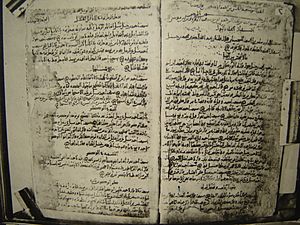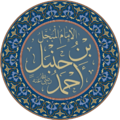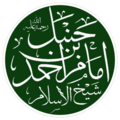Ahmad ibn Hanbal facts for kids
Quick facts for kids Abū ʿAbdillāh Aḥmad Ibn Muḥammad Ibn Ḥanbal Ash-Shaybānīأَبُو عَبْد ٱلله أَحْمَد ابْن مُحَمَّد ابْن حَنۢبَل ٱلشَّيْبَانِي |
|
|---|---|
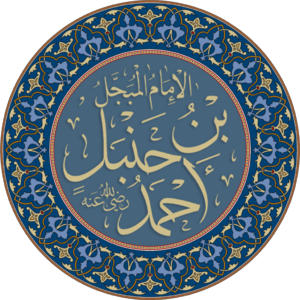
Aḥmad bin Ḥanbal's name in Arabic calligraphy
|
|
| Religion | Islam |
| Personal | |
| Born | November 780 CE Rabi-ul-Awwal 164 AH Baghdad, Abbasid Caliphate |
| Died | 2 August 855 CE 12 Rabi-ul-Awwal 241 AH (aged 74-75) Baghdad, Abbasid Caliphate |
| Senior posting | |
| Title | Sheikh ul-Islam, Imam |
| Religious career | |
| Works | Musnad Ahmad ibn Hanbal Radd ʿala’l-Ḏj̲ahmiyya wa’l-Zanādiḳa Kitāb al-Sunnah |
| Influenced | Particularly jurists and mystics of the Hanbali school like Abu Dawood, Al-Qadi Abu Ya'la, Ibn Aqil, Abdul-Qadir Gilani, Ibn al-Jawzi, Ibn Qudamah, Ibn Hamdan, Ibn Taymiyyah, Abdullah Ansari, Ibn Qayyim al-Jawziyyah, Ibn Rajab, Ibn Muflih, Mar'i al-Karmi and Sulayman ibn 'Abd al-Wahhab |
Aḥmad ibn Ḥanbal (780–855 CE) was a very important Arab Muslim scholar. He was a jurist (expert in law), theologian, and a hadith traditionist. He founded the Hanbali school of Islamic law, which is one of the four main schools in Sunni Islam.
Ibn Hanbal was a highly respected scholar during his time. He is known as one of the most important thinkers in Islamic history. He greatly influenced the traditional way of thinking in Sunni Islam. He believed in using religious texts as the main source for Islamic law and life. He also put together a very important collection of hadith (sayings and actions of Prophet Muhammad) called the Musnad. This book is still very important today.
He studied Islamic law and hadith with many teachers when he was young. Later in life, he became famous for his role in the Mihna. This was a time when the Abbasid ruler, al-Ma'mun, tried to force scholars to accept the idea that the Quran was "created." Ibn Hanbal strongly believed that the Quran was the eternal, uncreated Word of God. He faced physical hardship for sticking to his beliefs. His strength during this time made him even more respected in Sunni history.
Throughout history, Ibn Hanbal has been seen as a great example by all traditional Sunni thinkers. Both religious scholars and mystics respected him. Many mystics even called him a saint. A famous hadith scholar from the 14th century, al-Dhahabi, called him "the true Shaykh of Islām and leader of the Muslims."
In modern times, some groups, like Wahhabism, say they are influenced by Ibn Hanbal. However, some scholars argue that his actual beliefs were different from Wahhabism. For example, Ibn Hanbal supported using relics (holy objects), which is different from Wahhabi views.
Contents
Who was Ahmad ibn Hanbal?
|
||||||||||||||||||||||||||||||||||||||||||||||||||||||||||||||||||||||||||||||||||||||||||||||||||||||||||||||||||||||||||||||||||||||||||||||||||||||||||||||||||||||||||||||||||||||||||||||||||||||||||||||||||||||||||||||||||||||||||||||||||||||||||||||||||||||||||||||||||||||||||||||||||||||||||||||||||||||||||||||||||||||||||||||||||||||||||||||||||||||||||||||||||||||||||||||||||||||||||||||||||||||||||||||||||||||||||||||||||||||||||||||||||||||||||||||||||||||||||||||||||||||||||||||||||||||||||||||||||||||||||||||||||||||||||||||||||||||||||||||||||||||||||||||||||||||||||||||||||||||||||||||||||||||||||||||||||||||||||||||||||||||||||||||||||||||||||||||||||||||||||||||||||||||||||||||||||||||||||||||||||||||||||||||||||||||||||||||||||||||||||||||||||||||||||||||||||||||||||||||||||||||||||||||||||||||||||||||||||||||||||||||||||||||||||||||||||||||||||||||||||||||||||||||||||||||||||||||||||||||||||
His Early Life and Family
Ahmad ibn Hanbal's family came from Basra, Iraq. They belonged to an Arab tribe called Banu Shayban. His father was an officer in the Abbasid army. The family later settled in Baghdad, where Ahmad was born in 780 CE.
Ibn Hanbal had two wives and several children. One of his older sons later became a judge in Isfahan.
How He Studied and Worked
Imam Ahmad studied a lot in Baghdad. He also traveled to other places to learn more. He began studying Islamic law (Fiqh) with Abu Yusuf, a famous student of Imam Abu Hanifah.
After studying with Abu Yusuf, Ibn Hanbal traveled through Iraq, Syria, and Arabia. He collected hadiths, which are traditions of Prophet Muhammad. He had 414 hadith teachers! Because of his vast knowledge, he became a top expert on hadith. He created a huge collection of hadith called al-Musnad.
After years of travel, he returned to Baghdad. There, he studied Islamic law with Al-Shafi'i. Al-Shafi'i was a student of Malik ibn Anas, who was a student of Ja'far al-Sadiq. This shows how all four great Imams of Sunni law are connected to Ja'far, who was a descendant of Prophet Muhammad.
When he was older, Ahmad became a mufti (a scholar who gives legal opinions). He founded the Hanbali school of Islamic law. Today, this school is most common in Saudi Arabia, Qatar, and the United Arab Emirates. Unlike the other three schools of Islamic law, the Hanbali school stayed very traditional in its beliefs.
Besides his studies, Ibn Hanbal was also a soldier on the Islamic borders. He performed the Hajj (pilgrimage to Mecca) five times, twice on foot.
His Passing Away
| Imam Aḥmad | |
|---|---|
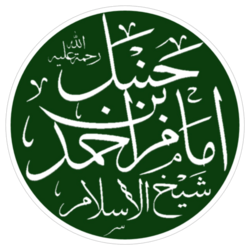
Imam Aḥmad's name in the style of Arabic calligraphy
|
|
| Tābiʿ al-Tābiʿūn Jurist, Theologian, Hadith Traditionist, Maddhab Founder "Defender of Orthodoxy", "True Shaykh of Islam", "Proof of the Faith", "Seal of the Mujtahid Imams", "Reinforcer of the Religion", "One who Gathered the Knowledge of the First and the Last", "Guardian of the Prophet's Traditions", "Confirmer of Relics" |
|
| Born | Baghdad, Iraq |
| Venerated in | Traditionalistic Sunni Islam (Salafi Traditionalists honor rather than venerate him). |
| Major shrine | Imam Ahmad Bin Hanbal Shrine, Baghdad, Mesopotamia |
Ibn Hanbal died on August 2, 855 CE, in Baghdad, Iraq. He was 74 or 75 years old. Historians say that 800,000 men and 60,000 women attended his funeral. It is also said that 20,000 Christians and Jews converted to Islam on that day. His grave is in the Imam Ahmad Bin Hanbal Shrine in Baghdad.
What was the Mihna?
Ibn Hanbal is famous for being called before the Inquisition, or Mihna. This was set up by the Abbasid Caliph Al-Ma'mun. The Caliph wanted to show his religious power. He pressured scholars to agree with the Mu'tazila view that the Qur'an was "created."
Sunni tradition says that Ibn Hanbal was one of the scholars who refused to accept this idea. He stood firm against the Caliph's interference and the Mu'tazili belief. His strong stand helped the Hanbali school become known not just for law, but also for its theological beliefs.
Because he refused to accept the Mu'tazilite authority, Ibn Hanbal was put in prison in Baghdad. This happened during the rule of al-Ma'mun. Later, under al-Ma'mun's successor, al-Mu'tasim, Ibn Hanbal was even flogged until he lost consciousness. But this caused a lot of trouble in Baghdad, and al-Mu'tasim had to release him.
After al-Mu’tasim died, al-Wathiq became caliph. He continued the same policies and banished Ibn Hanbal from Baghdad. It was only after al-Wathiq's death, when his brother al-Mutawakkil became caliph, that Ibn Hanbal was welcomed back to Baghdad. Al-Mutawakkil was much more supportive of traditional Sunni beliefs.
What were his main ideas?
Ibn Hanbal's main idea was "traditionalist thought." This means he believed that only the Quran and hadith should be the basis for true Islamic belief. However, he also thought that only a few special people were allowed to interpret these holy texts.
His Views on God and the Quran
Understanding God
Ibn Hanbal believed that the best way to understand God was through the description given in the Quran. He said that God is unique and cannot be compared to anything in His creation. He believed that all of God's qualities, like hearing, sight, and speech, are real. He also believed that certain "ambiguous" qualities, like God's hand or throne, should be accepted as they are, without trying to explain them too much.
Ibn Hanbal did not like those who tried to remove God's qualities or explain them away. He also criticized those who imagined God to be like humans. He thought it was best to worship God without trying to understand "how" He is, leaving God's mystery to Him.
The Quran's Nature
One of Ibn Hanbal's most important contributions was his strong belief that the Quran is the "uncreated Word of God." He believed that the Quran, with all its letters, words, and ideas, is truly God's Word and not something created.
His Views on Mysticism and Relics
Mystical Connections
Ibn Hanbal had a good relationship with many early Sufi saints. He showed them respect and kindness. He was asked about Sufis who stayed in mosques, and he replied, "Knowledge made them sit." He even identified Maruf Karkhi, an early Sufi, as one of the "abdal" (major saints). He said Maruf's prayers were answered.
Ibn Hanbal also praised other Sufis like Bishr the Barefoot. He even sent his son, Salih, to study with Sufis. He said, "I do not know of any people better than them."
Sufis also highly respected Ibn Hanbal. They often called him a saint. Hujwiri, a famous Sufi, wrote that Ibn Hanbal was "distinguished by devoutness and piety." He also mentioned that Ibn Hanbal associated with great Sufi leaders.
Some people think Ibn Hanbal or his school were against Sufism. But scholars say this is not true. The Hanbali school did not attack Sufism more than any other school. Many important Sufis, like Abdul Qadir Gilani, followed the Hanbali school of law. Abdul Qadir Gilani was one of the most famous Sufis of his time. The Sufi order he founded, the Qadiriyya, is still very popular today. Even later Hanbali scholars who criticized some Sufi groups never condemned Sufism itself.
Holy Relics
Ibn Hanbal believed in the power of relics (holy objects) and seeking blessings from them. He often carried hairs from the Prophet Muhammad in his sleeve. His son Abdullah said that his father would kiss the Prophet's hair and even dip it in water to drink for healing.
Ibn Hanbal also drank from the Prophet's bowl to seek blessings. He thought it was okay to touch and kiss the Prophet's sacred minbar (pulpit) for blessings. He even asked to be buried with the Prophet's hairs.
A famous scholar, al-Dhahabi, said that Ibn Hanbal sought blessings from the Prophet's relics. He strongly criticized anyone who disagreed with seeking blessings from holy relics.
Visiting the Prophet's Grave
When his son Abdullah asked about touching and kissing the grave of the Prophet in Medina, Ibn Hanbal said it was allowed according to Islamic law.
His Views on Islamic Law
Independent Reasoning by Scholars
Ibn Hanbal had strict rules for ijtihad (independent reasoning) by muftis (scholars who give legal opinions). He believed that a scholar needed to have memorized a huge number of hadiths to be able to give independent legal opinions. He once said that even 500,000 memorized hadiths might just be enough. This shows he believed only the most knowledgeable scholars should make such judgments.
Avoiding Misuse of Hadith
Ibn Hanbal warned against following every single "dispensation" (rukhṣa) found in hadith. He said that if someone did this, they could become a transgressor. He likely said this because there were many forged (fake) hadith reports at the time.
Accepting Differences of Opinion
Ibn Hanbal was praised for accepting different legal opinions among the Islamic schools of law. He believed that every school of law was correct. He did not like it when a scholar insisted that people follow only their view, even if they thought others were wrong. He advised a student who wrote a book on legal differences to call it The Book of Leeway instead of The Core of Divergence. This shows his open-mindedness.
His Writings
Here are some of the books written by Ibn Hanbal:
- Usool as-Sunnah: "Foundations of the Prophetic Tradition (in Belief)"
- asSunnah: "The Prophet Tradition (in Belief)"
- Kitab al-`Ilal wa Ma‘rifat al-Rijal: "The Book of Narrations Containing Hidden Flaws and of Knowledge of the Men (of Hadeeth)"
- Kitab al-Manasik: "The Book of the Rites of Hajj"
- Kitab al-Zuhd: "The Book of Abstinence"
- Kitab al-Iman: "The Book of Faith"
- Kitab al-Masa'il "Issues in Fiqh"
- Kitab al-Ashribah: "The Book of Drinks"
- Kitab al-Fada'il Sahaba: "Virtues of the Companions"
- Kitab Tha'ah al-Rasul: "The Book of Obedience to the Messenger"
- Kitab Mansukh: "The Book of Abrogation"
- Kitab al-Fara'id: "The Book of Obligatory Duties"
- Kitab al-Radd `ala al-Zanadiqa wa'l-Jahmiyya "Refutations of the Heretics and the Jahmites"
- Tafsir: "Exegesis"
- Musnad of Imam Ahmad ibn Hanbal
How Historians Saw Him
Ibn Hanbal has been highly praised for his work on prophetic traditions and for defending traditional Sunni beliefs. Abdul-Qadir Gilani, a famous scholar, said that a Muslim could only truly be close to God if they followed Ibn Hanbal's beliefs. Even though he received much praise, Ibn Hanbal was known for never boasting about his achievements.
However, not all of his legal views were accepted by everyone. Muhammad ibn Jarir al-Tabari, a Quranic scholar, once wanted to study with Ibn Hanbal. But later, he said he did not consider Ibn Hanbal a jurist. He saw him only as an expert in prophetic traditions. Similarly, another scholar, Ibn 'Abd al-Barr, did not include Ibn Hanbal in his book about the main Sunni jurists. So, while everyone agreed on his skill in hadith, his status as a legal expert was sometimes debated.
Images for kids
See also
 In Spanish: Ahmad bin Hanbal para niños
In Spanish: Ahmad bin Hanbal para niños


